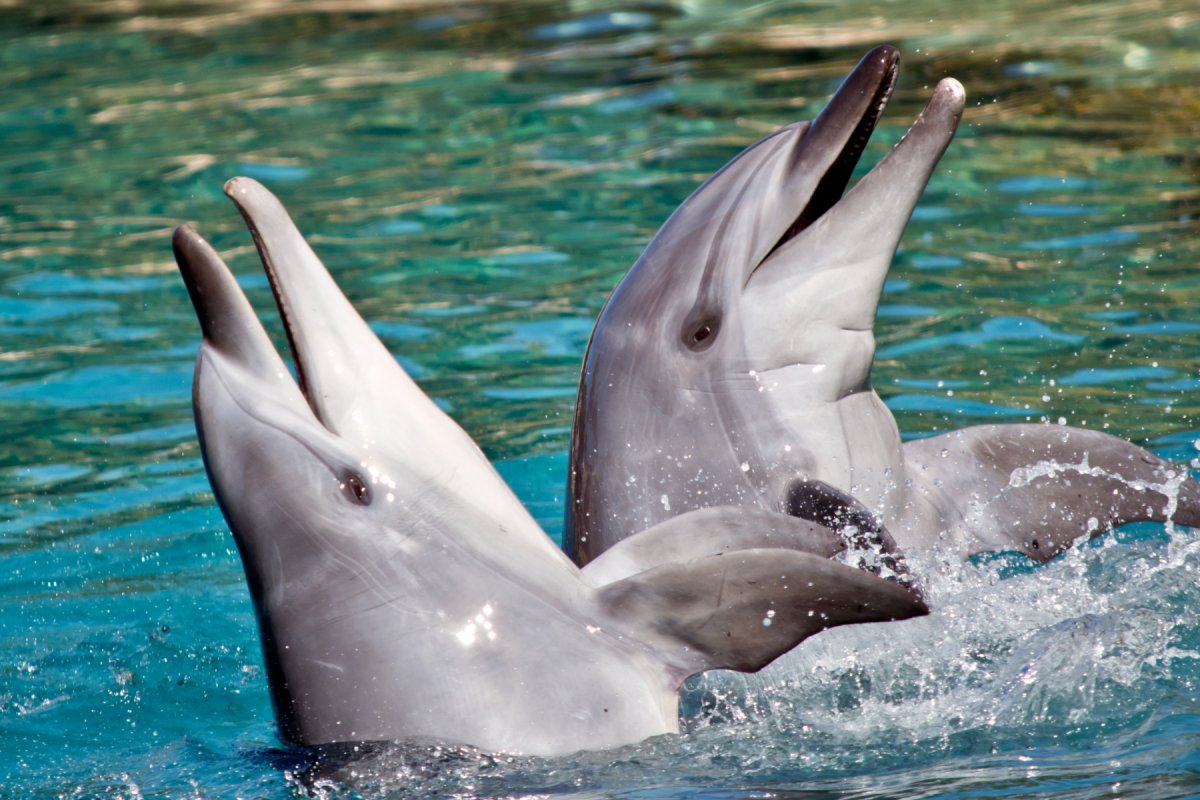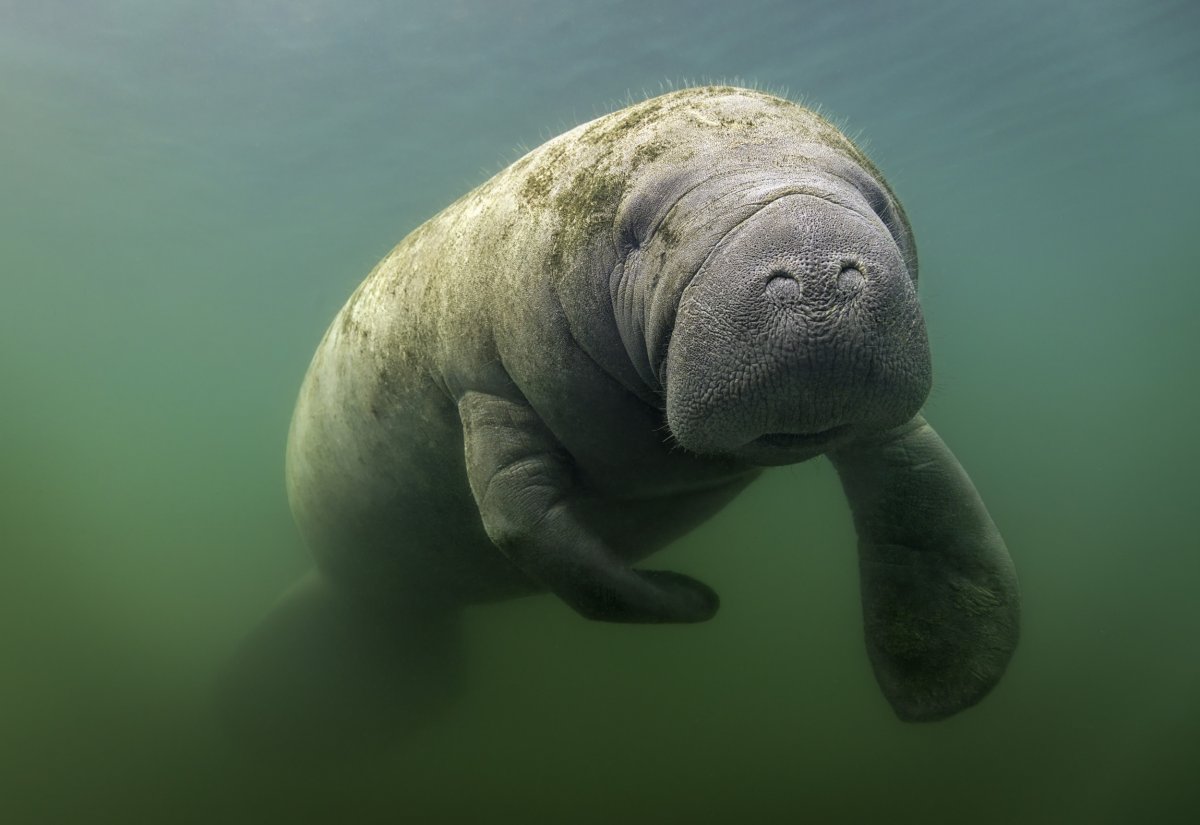Dolphins have been attacking the babies of their cousin species, the manatees, scientists have found.
This strange aggressive behavior has been spotted 10 times over the course of over two decades, with the large majority of instances occurring in the past eight years according to a new study in the journal PLOS One.
The bottlenose dolphins were seen to target manatee calves that had been orphaned, as well as those still with their mothers. The interactions left many of them injured and covered in rake marks from the dolphins' teeth. One even succumbed to its injuries.

"We report 10 cases of interactions between bottlenose dolphins and Antillean manatee calves along the coast of Belize in the Caribbean Sea. We observed dolphins interact with manatee babies in various ways, sometimes swimming with the baby calmly and in other cases, getting aggressive with calves and biting and hitting them. Four of the 10 cases we documented involved manatee babies that were recovered and had dolphin bite marks on them," Eric Angel Ramos, study author and researcher at the Fundación Internacional para la Naturaleza y la Sustentabilidad, told Newsweek.
These attacks were recorded off the coast of Belize in South America between 1999 and 2020. Most of them occurred between 2015 and 2020.
"There were seven interactions we saw between dolphins and baby manatees, and four that we found with bite marks, with one that we saw interacting with dolphins and found with bite marks. Two of them we saw with a drone were manatee mothers with their calves. In all other cases, the manatees were orphaned and not found with mothers. We know that four of the babies had bite marks and one that was injured badly and later died of an infection likely associated with industries. We can't say for sure how many were actually injured," Ramos said.
Bottlenose dolphins are highly social animals, living in large pods, and are considered to be one of the most intelligent species in the world.
While many of the dolphins' interactions with the manatees resulted in the manatees being injured, the researchers weren't entirely sure if they always wanted to inflict harm. In one of the cases, several of the dolphins were seen swimming alongside the calf and push it toward the surface, while others rammed the manatee and launched it into the air. This and other cases where the manatee was pushed toward the surface could be interpreted as an attempt to care for the calf.
"We don't know if they are really trying to hurt them or not. Dolphins play rough. They don't have hands, so when they socialize or mate or play, they tend to bite each other and hit each other with their tails," Ramos said. "They may be treating manatees roughly but not actually trying to hurt them. However, bottlenose dolphins are also known to kill baby dolphins of their species, and probably others. So the drive to attack and kill young could help explain how they treat babies of other species."
This behavior has been seen several times in the wild, with one pod of orcas—also a species of dolphin—seemingly adopting a pilot whale calf. Alternatively, the dolphins may have been attempting to steal or kidnap the calf.
"Bottlenose dolphins have been reported doing it to other species of dolphin. They regularly interact with other species of marine mammals, and in some cases, they kill other species," Ramos explained. "For example, in the U.K. and along the coast of California, they kill porpoises. In lots of other places they are know to get aggressive with other species of dolphins and other marine mammal species. But it's really hard to understand these interactions because you don't see them a lot and it's difficult to determine who is involved and what the context of the interaction is."

The dolphins' aggression towards the manatees may stem from a perception of them as competition for food or other resources. Bottlenose dolphins have also been seen to act aggressively with a number of other species that they share a range with.
More research needs to be done to fully understand why the dolphins keep doing this, and what triggers them to approach the manatee.
"We do lots of studies of manatees on dolphins throughout the Caribbean. Some of these involve studying how manatees use their habitats throughout the country, using tools like drones to photo identify them from the air and track their behavior. We also use acoustic recorders deployed in dolphin and manatee habitats to study how they communicate and what is important to them in their habitats," Ramos said.
"The take home message is that dolphins show complex behaviors and sometimes they interact with other species in ways similar to the way they interact with each other, and that can be aggressive and sometimes lead to injuries."
Do you have a tip on a science story that Newsweek should be covering? Do you have a question about dolphins? Let us know via science@newsweek.com.
Update 01/25/24, 12:10 p.m. ET: This article was updated with comment from Eric Angel Ramos.
Uncommon Knowledge
Newsweek is committed to challenging conventional wisdom and finding connections in the search for common ground.
Newsweek is committed to challenging conventional wisdom and finding connections in the search for common ground.
About the writer
Jess Thomson is a Newsweek Science Reporter based in London UK. Her focus is reporting on science, technology and healthcare. ... Read more
To read how Newsweek uses AI as a newsroom tool, Click here.








